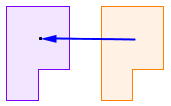In this two-day workshop, I will present kinesthetic and hands-on activities, and some enrichment lessons. This manipulatives-based curriculum is intended to complement related work in paper-pencil, compass-straightedge, and technological environments: it serves to preview, review or extend key concepts in geometry (grades 7-10.)
- Tools include manipulatives (such as pattern blocks and geoboards) and puzzles (such as tangrams, pentominoes and supertangrams).
- Activities include "walking geometry," "soccer angles," "tile design," and "rep-tiles."
- GeoGebra will be used to illustrate concepts, and for a highly motivating construction unit.
These lessons were developed in somewhat heterogeneous classes, and reach a wide range of students. They provide support for the less visual by complementing the drawing and studying of figures, and enrichment for the more talented by offering deep and challenging problems. In addition, participants will get to take some of the problems to a deeper teacher level.
Transformational Geometry
with Henri Picciotto
Monday-Tuesday 23-24 June 2014
9:00 a.m. to 3:30 p.m.

In this two-day workshop, I will help participants prepare for the Common Core State Standards, which call for a complete rethinking of geometry in grades 8-11. Instead of basing everything on congruence and similarity postulates, as is traditional, the idea is to build on a basis of geometric transformations: translation, rotation, reflection, and dilation.
In order to teach this effectively, it is important to have a solid understanding of the underlying math, as well as ideas for rich activities for students. I have been teaching transformational geometry for twenty years, and have a lot to share:
- Composition of transformations -- the four isometries and their fundamental properties.
- Symmetry in depth -- around a point, along a strip, in the plane. Connections to art and design. Tiling.
- Computing geometric transformations with the help of complex numbers at first, then matrices -- this is the mathematics that underlies all computer graphics/.
- Intelligent use of GeoGebra to support all this. (No GeoGebra background required.)
- We will also discuss the impact of these changes on the teaching of proof.
GeoGebra is free software, available for every computer and tablet platform.
In this one-day workshop, I will introduce some advanced features which make it a powerful tool for teachers to create activities for any part of secondary school math. This includes:
- use of additional panes for a spreadsheet, computer algebra, or more graphics/.
- interface features such as sliders, hide-show buttons, and animation.
- creative use of lists to create figures that involve repetition, and figures that have multiple versions
Prior experience with GeoGebra is required. That condition can be met by taking the Transformational Geometry workshop.
Additional work with GeoGebra is included in the No Limits workshop. Taking all three workshops would help get a sense of how to integrate GeoGebra with curriculum in grades 8-11.
This two-day workshop is designed for high school mathematics teachers who want to make Algebra 2, Trigonometry and Precalculus more accessible, richer and more fun. I will present a number of activities to enrich and deepen the corresponding lessons in any textbook, whether traditional or reform.
- Concrete introductions to exponential, logarithmic, inverse variation, and trig functions
- Functions from patterns; functions from geometry
- Function diagrams: upper level applications
- Iterating functions as a gateway to sequences, series, mathematical induction and chaos
- Geometry of the parabola (2D, 3D)
A frequent challenge in teaching upper level high school classes is the limited pedagogical range of most textbooks and curricula. This is particularly harmful to the students who find symbol manipulation difficult, but it is also cheating our stronger students of the multi-faceted understanding that would serve them best. To address this, several of the units presented in the workshop involve the intelligent use of electronic tools (particularly GeoGebra,) hands-on activities with concrete materials, and/or creative alternate representations.


